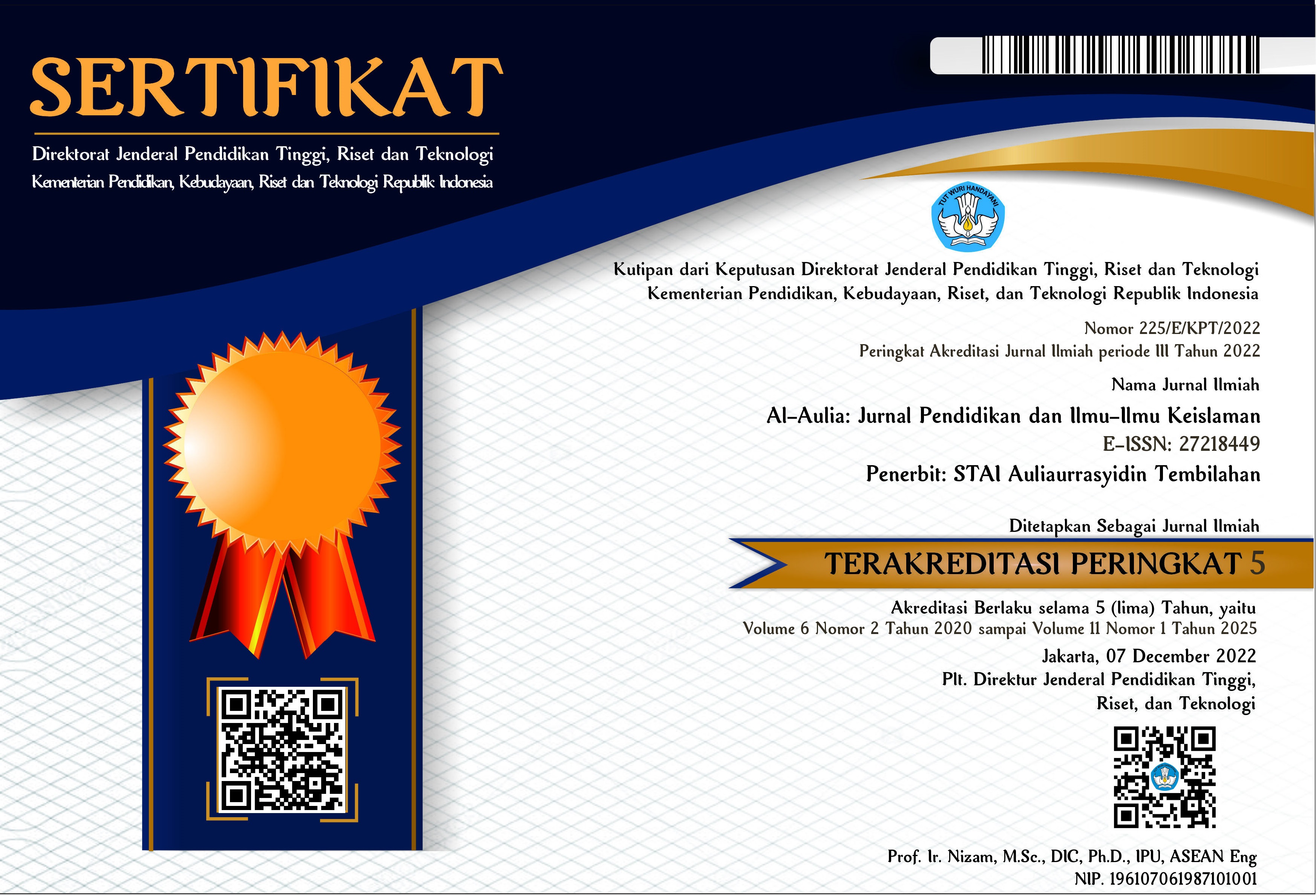Hasan Al-Banna's Concept of Thought in the Perspective of Islamic Education
DOI:
https://doi.org/10.46963/aulia.v9i2.1429Keywords:
Hasan Al-Banna, Thoughts, Islamic EducationAbstract
This article attempts to examine and understand Hasan Al-Banna's thoughts from an Islamic Education Perspective. And the thought of Islamic education is a series of work processes of the mind and heart that are carried out seriously in looking at various problems that exist in Islamic education and trying to build an educational paradigm that can become a vehicle for complete guidance and development of students. Hasan Al-Banna is the founder of the Ikhwan al-Muslimin movement, one of the largest and most influential Islamic organizations in the 20th century. As for this research, which is in the form of library research, in the process of collecting data, the author collects data in the form of information through literature that the author obtains in the form of books or articles, magazines, or seminar results. and other information related to the issue being raised, namely reviewing the thoughts on Islamic education according to Hasan al-Banna. Considering that this research is qualitative research, data analysis was carried out using the following approach: First, a historical approach. Second, the descriptive approach. Each material or data is analysed, analysed, described, and concluded inductively. This research is descriptive analysis. The research results show that the idea of thinking in education is total and holistic, divinely oriented, universal, integrated, balanced, and full of positive and constructive skills. then data analysis was carried out using the following approach: First, a historical approach. Second, the descriptive approach. Each material or data is analysed, analysed, described, and concluded inductively. This research is descriptive analysis. The research results show that the idea of thinking in education is total and holistic, divinely oriented, universal, integrated, balanced, and full of positive and constructive skills. then data analysis was carried out using the following approach: First, a historical approach. Second, the descriptive approach. Each material or data is analysed, analysed, described, and concluded inductively. This research is descriptive analysis. The research results show that the idea of thinking in education is total and holistic, divinely oriented, universal, integrated, balanced, and full of positive and constructive skills.
References
A. Susanto. (2009). Thoughts on Islamic Education, Jakarta: Amzah.
Abdul Hamid al-Ghazali. (2001). Paving the Way for Islamic Awakening: Hasan al-Banna's Map of Thought, trans. Wahid Ahmadi, Jakarta: Intermedia.
Abdul Munir Mulkhan. (1993). Muslim Intellectual Paradigm: Introduction to the Philosophy of Islamic Education and Da'wah, Yogyakarta: SIPRESS.
Al-Aziz, Jum'ah Amin Abd, and Syafrudin Edi Wibowo. (2007). Binâ` Dâkhiliy 1928--1938: History of the Formation and Development of Jama'ah Al-Ikhwân al-Muslimûn. Solo: The Intermedia Era
Al-Banna, Hasan. (1992). Majmû'ah Rasâ`il al-Imam al-Syahid Hasan al-Bannâ.
Ali Abd. Halim Mahmud. (2000). Spiritual Education, trans. Abdul Hayyie al-Kattani, Jakarta: Gema Insani Press.
Al-Qardhawi, Yusuf. (2005). Tarbiyah Hasan Al-Bannâ` in Jamâ'ah Al-Ikhwân al-Muslimûn. Translated by Asep Sobari. Jakarta: Robbani Press
Al-Qordhawi, Yusuf. (2004). 70 Years of the Muslim Brotherhood: Glimpse of Tarbiyah and Jihad Da'wah, translator; Mustolah Maufur and Abdurrahman Husain, cet 1 Jakarta; Kautsar Library.
Hasan Al-Banna. (1411). Majmu' at Rasa „il al-Imam al-Syahid Hasan al-Banna, Cairo: Dar al-Da'wah.
Ihsan, Hamdani & Ihsan, Fuad. (2007). Philosophy of Islamic Education in Bandung: CV Pustaka Setia.
Jones, K. (2009) Interviewed by Hamid, 7 July.
Jung, Dietrich, and Ahmed Abou El Zalaf. (2020). Hasan al-Banna and the Modern Muslim Self: Subjectivity Formation and the Search for an Islamic Order in Early Twentieth Century Egypt. Muslim Subjectivities in Global Modernity. Islamic Traditions and the Construction of Modern Muslim Identities. Leiden: Brill.
Kholiq, Abdul (1999). Thoughts on Islamic Education, Study of Ktasik and Contemporary Figures, Semarang: Faculty of Tarbiyah IAIN Walisongo Semarang in collaboration with Student Library.
Mahfudz Siddiq. (2003). KAMMI and the Reformation Struggle, Solo: Intermedia Era.
Mahmud, Ali Abd Al-Halim. (2001). Al-Ikhwân al-Muslimûn Tarbiyah Tools. Translated by Wahid Ahmadi. Solo: The Intermedia Era.
Mohammad, H. et al. (2006). Influential Islamic Figures of the 20th Century. Jakarta: GemaInsani Press.
Mulkhan, Abdul Munir. (1993). Muslim Intellectual Paradigm, Introduction to the Philosophy of Islamic Education and Da'wah, Yogyakarta: SIPRESS.
Morsi, Muhammad Sa'id. (2007). Great Islamic Figures Throughout History. Jakarta; Al-Kautsar Library.
Said Eve. (2005). Building a Mujahid Force: An Analytical Study of Hasan al-Banna's Da'wah in the Ta'lim Treatise, trj. Abu Ridho, Solo: Intermedia Era.
Talib, Muhammad. (2008). Sakinah Family Encyclopedia; Tips and Arts for Educating Children, Yogyakarta: Pro-U Media,
Uthman Abd. Al-Mu'iz Ruslan. (2000). al-Tarbiyah al-Siyasiyyah „Ind al-Ikhwan al-Muslimin, Cairo: Dar al-Tauz-wa al-Nasyr al-Islamiyyah.
Downloads
Published
Issue
Section
License
Copyright (c) 2023 Jais Aswanda, Djeprin E. Hulawa, Eva Dewi

This work is licensed under a Creative Commons Attribution-ShareAlike 4.0 International License.
Authors who publish with this journal agree to the following terms:
1. Copyright on any article is retained by the author(s).
2. The author grants the journal, right of first publication with the work simultaneously licensed under a Creative Commons Attribution License that allows others to share the work with an acknowledgment of the work’s authorship and initial publication in this journal.
3. Authors are able to enter into separate, additional contractual arrangements for the non-exclusive distribution of the journal’s published version of the work (e.g., post it to an institutional repository or publish it in a book), with an acknowledgment of its initial publication in this journal.
4. Authors are permitted and encouraged to post their work online (e.g., in institutional repositories or on their website) prior to and during the submission process, as it can lead to productive exchanges, as well as earlier and greater citation of published work.
5. The article and any associated published material is distributed under the Creative Commons Attribution-ShareAlike 4.0 International License







